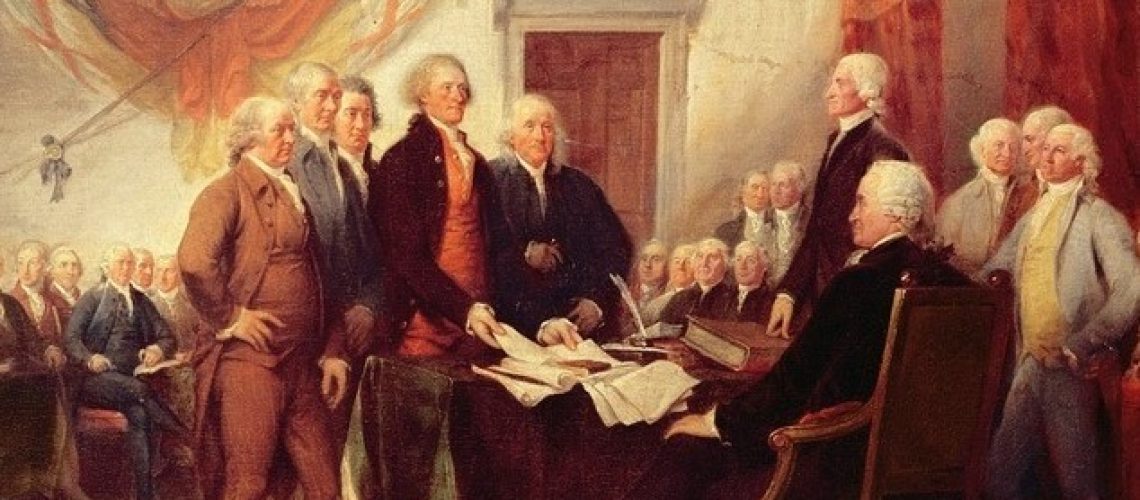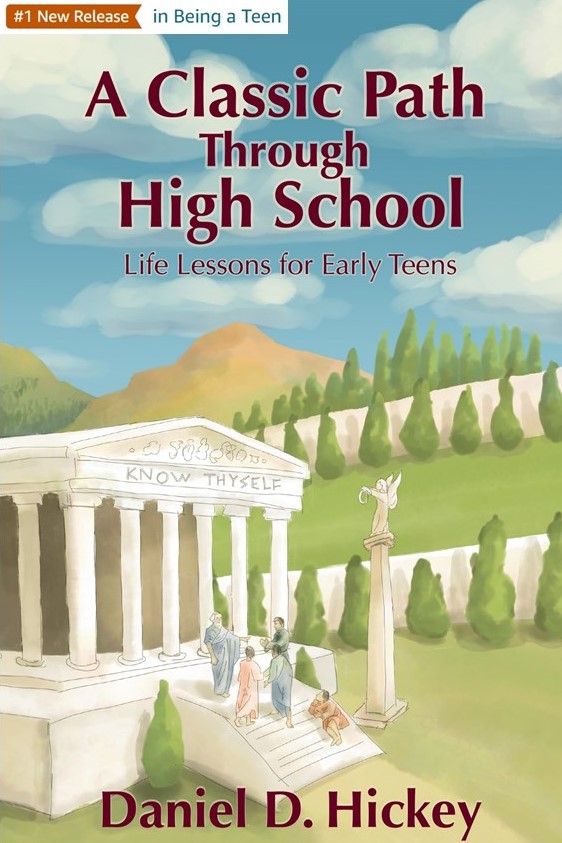We hold these truths to be self-evident, that all men are created equal, that they are endowed by their Creator with certain unalienable Rights, that among these are Life, Liberty and the pursuit of Happiness.–That to secure these rights, Governments are instituted among Men, deriving their just powers from the consent of the governed, –That whenever any Form of Government becomes destructive of these ends, it is the Right of the People to alter or to abolish it, and to institute new Government, laying its foundation on such principles and organizing its powers in such form, as to them shall seem most likely to effect their Safety and Happiness.
Thus did humanity pivot on July 4, 1776. A band of radical intellectuals, combining the principals of the Magna Carta with John Locke’s Enlightenment philosophy of individual property and rights, met in Philadelphia and chose Thomas Jefferson of Virginia to write their Declaration of Independence from the British Empire. More than the self-evident truth that all men are created equal, the second paragraph quoted above declared it to be the right of the people to institute their chosen form of government. Up to that point in history, only emperors, popes, and kings had that power. The colonial representatives knew the King’s punishment would be death, so they girded themselves for war in pursuit of their just cause.
America’s original sin
By 1776, the American economy had grown over 150 years since the Pilgrims landed at Plymouth to be the most dynamic on earth. The new world was attracting entrepreneurs from around the old world who were forming local businesses and governments, while strafing under decrees from a distant monarch. Jefferson also mentioned the King’s sanctioning of the slave trade among the list of grievances in an earlier draft. That was edited out since so many of the representatives were complicit in slavery, Jefferson himself. Historians estimate that one in five Americans then were slaves, and factions had formed against the institution. John Adams called slavery “an evil of colossal magnitude” but agreed to leave the subject out of The Declaration in order to gain the unanimous support of all the colonies.
Jefferson may not have anticipated the impact his seismic words would have. He said he merely wanted “to place before mankind the common sense of the subject.” He might have hated slavery, but not his own slaves. He had a relationship with one that has fascinated historians and psychologists for centuries. Jefferson provides an extreme example of humanity existing in a constant struggle between right and wrong. Even the saints we venerate are not considered to have lived without sin.
As president of the American Philosophical Society, and founder of the University of Virginia, Jefferson knew the significance of using words like a creator bestowing unalienable rights upon each of us. This truly revolutionary concept inspired citizens across the colonies to take up arms against tremendous odds. After victory over Great Britain, the colonists drafted The United States Constitution whose Bill of Rights represented ten more assaults on the institution of slavery. Money and power die hard however and it took four score and seven more years.
Redemption
Abraham Lincoln favored the Declaration over the Constitution as weapons in his rhetorical assaults on slavery. He grew up under an oppressive father who hired him out for labor and kept his earnings, which may have given him special empathy for those living in bondage. Slavery demonstrated a stark contrast between right and wrong, as Lincoln compared it to “the common right of humanity and the other the divine right of kings. … You work and toil and earn bread, and I’ll eat it.” He framed his argument as akin to the colonists’ complaints against the King.
Lincoln hated slavery because it deprived America of “its just influence in the world” and made us look like hypocrites declaring all men to be created equal. He spoke eloquently against the institution as he rose in political prominence while acknowledging its integration into American society. Although he hated seeing his fellow man in chains, Lincoln was content to limit the institution to the states in which it was already legal. Expanding the moral abomination into the new western states was the red line.
After that and other lines were violated, Lincoln waged America’s bloodiest war by suspending some basic liberties like freedom of speech and the right not to be unjustly detained. Historians have called him Machiavellian for some of the questionable means by which he achieved his ends, but nobody debates the importance of preserving the Union and ending slavery. Lincoln’s Emancipation Proclamation completed what Jefferson’s Declaration began. It was only after the stain of slavery was washed with the blood of patriots from the fabric of America that the country could become the true beacon of freedom to the world.
In his second inaugural address, delivered after the Civil War and 42 days before he was assassinated, Lincoln said: “With malice toward none; with charity for all; with firmness in the right, as God gives us to see the right, let us strive on to finish the work we are in.” As great as America was, he saw it as still unfinished.
Truth to Power in Birmingham
A century later, African Americans were free but still not equal under the laws of the segregated southern states that treated them as second-class citizens. It took another great man to rally his nation to recognize and correct societal injustice.
Martin Luther King Jr. was initially disappointed in being called an extremist but came to favor the term. “Was not Jesus an extremist in love? – ‘Love your enemies’… Was not Abraham Lincoln an extremist? – ‘This nation cannot survive half slave and half free.’ Was not Thomas Jefferson an extremist? – ‘We hold these truths to be self-evident, that all men are created equal.’” The question is “will we be extremists for hate, or will we be extremists for love?” Despite the horrid injustice of the times, King was optimistic as he saw his people as an integral part of America since “before the Pilgrims landed at Plymouth.” Turning Machiavelli on his head, he writes “nonviolence demands that the means we use must be as pure as the ends we seek.”
On August 28, 1963, hundreds of thousands of people of all races gathered under Lincoln’s memorial in Washington, DC to hear King’s speech about having a dream that one day his four children will not be judged by the color of their skin but by the content of their character. Dr. King finished that great speech longing to sing “Free at last! Free at last! Thank God Almighty, we are free at last!” The demonstration and speech won him the Noble Peace Prize but five years later on April 4, 1968, Dr. Martin Luther King Jr. was also assassinated.
Fifty years later the fire of his spirit burned brightly when his children were able to vote for the first African American President of the United States.
What You Can Do for Your Country
The American journey has been a long and bumpy path guided by the truths expressed in our Declaration of Independence that have provided a beacon to target for centuries. President John F. Kennedy asked us all to contribute our individual talents to the great American experience that has driven human evolution since Jefferson declared those self-evident truths. “Ask not what your country can do for you – ask what you can do for your country” he implored us, before sacrificing his own life for his country, so that we can achieve “a more fruitful life for all mankind.” We have always fallen short of the Founders’ full ideal but no other nation has challenged America’s commitment to equality and the Right to Life, Liberty and the pursuit of Happiness.
After signing the Declaration of Independence, John Adams predicted that July 4th would be celebrated “with pomp and parade, with shows, games, sports, guns, bells, bonfires, and illuminations from one end of this continent to the other from this time forward forever more.” Forever more indeed, another eternal truth from the Founders.
Happy 4th of July!

